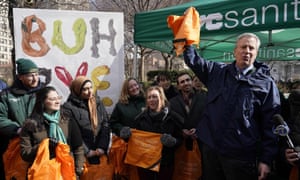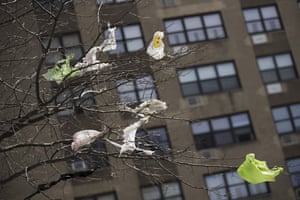The fight to ban plastic bags, many of which end up polluting oceans and rivers, has taken a step backward as conservative US think-tanks exploit the fear of Covid-19, campaigners have said.
Articles warning that reusable cloth bags are worse than plastic ones for spreading coronavirus have been linked to major rightwing nonprofits such as the Manhattan Institute, and contain misinformation aimed at defeating or repealing plastic bag bans, said Greenpeace USA.
The effort “risks further confusion” amid a global public health crisis, it said.
Recent studies have found that Covid-19 could be stable on plastic and steel for up to three days, compared with 24 hours for cardboard and four hours for copper. The studies have not examined how long the virus remained on cloth and there is little scientific evidence comparing reusable bags with plastic.
Last week a number of US states and cities nevertheless took the decision to roll back plastic bag bans, citing the coronavirus. Maine repealed its ban. The governor of New Hampshire went further by issuing an order banning reusable bags, saying they risk spreading coronavirus. The governor of Massachusetts banned reusable bags and lifted plastic bag bans. And New York state, which implemented its plastic bag ban on 1 March, will delay enforcement until June.
The moves come after a lobbying effort by groups including the Manhattan Institute and the Competitive Enterprise Institute (CEI), a libertarian nonprofit instrumental in persuading the Trump administration to abandon the Paris climate agreement.
While nonprofits are not required to disclose their donors, both have reportedly received money from fossil fuel companies. Among the sponsors for a CEI gala last year were the Charles Koch Institute and the American Fuel and Petrochemical Manufacturers association, the New York Times reported.
Greenpeace USA criticised the Manhattan Institute and the CEI for a series of articles suggesting that reusable bags are a higher risk for transmitting coronavirus than plastic bags, misrepresenting recent research that shows the virus survives at least as long on plastic.
Such misinformation is already being used to lobby state legislatures to defeat or repeal plastic bag ban legislation, it said.
John Hocevar, Greenpeace USA’s oceans campaigner, condemned what he described as industry groups that have “seen the crisis as an opportunity to exploit people’s fears around Covid-19 to push their pro-pollution agendas”.
“Even in the short term, plastic does not inherently make something clean and safe, and we should not confuse corporate public relations with factual medical research,” Hocevar said.

Similar moves are under way in Britain, where the environment secretary, George Eustice, has waived the 5p charge on plastic bags for supermarket shoppers online. Eustice said it was a temporary measure aimed at reducing potential cross-infection between delivery workers and those in isolation, and to speed up deliveries.
Plans to further reduce single-use plastic, under the environment bill, have been put on hold due to Covid-19.
The Welsh government’s plans to reduce single-use plastic are also under review due to the pandemic, it told the Guardian.
In the US, the misinformation campaign against reusable bags ramped up after two recent studies. The first, from the University of California, published last month in the Journal of Hospital Infection, reported that viruses similar to Covid-19 could remain on plastic for up to nine days. The second, published on 17 March in the New England Journal of Medicine, found that Covid-19 could be stable on plastic for up to three days. The viruses could be inactivated by disinfection. Neither study examined fabric.
However, the day after the first study was published, the Plastics Industry Association wrote to the US Department for Health and Human Services, urging the government to make a pronouncement supporting single-use plastic. The association claimed “study after study” showed reusable bags to be a health risk. It did not mention the University of California study.
Then, on 12 March, the Manhattan Institute authored an article in the City Journal claiming: “The ‘sustainable’ bags that environmentalists and politicians have been so eager to impose on the public … can sustain the Covid-19 and flu viruses and spread the virus throughout the store.”
The piece, headlined “Greening our way to infection” and written by John Tierney, cites unnamed research that Tierney claims showed viruses and bacteria can survive on tote bags for nine days. It offers no evidence to back this claim – in fact, it links to a study showing viruses can remain on plastic for nine days.
The piece also quotes a 2018 study published in the Journal of Environmental Health where researchers found traces of a surrogate virus on surfaces and the hands of shoppers and store staff high enough “to risk transmission”. They recommended in-store hand hygiene and washing reuseable bags. They did not compare the risk of reusable bags with new plastic bags.
Another piece by Tierney, with a similar argument, appeared in the New York Post entitled “Using tote bags instead of plastic could help spread coronavirus”.
Meanwhile, the Washington Examiner published a piece by Angela Logomasini of the Competitive Enterprise Institute on 18 March, a day after the New England Journal of Medicine study, headlined: “Plastic bag bans aren’t helping us fight against coronavirus”.
Logomasini quotes the same 2018 study as Tierney, as well as a 2011 study on reusable and plastic bags that looked at bacteria, not viruses, and was partly funded by the American Chemistry Council.
Ivy Schlegel, a researcher at Greenpeace USA, said: “This is a classic PR tactic. After new studies showing Covid-19 lasts longer on plastic, they have pulled back into their bag of tricks to redeploy old studies, linking them to legitimate public fear of the coronavirus.”
Hocevar said: “The truth is that we don’t have all of the answers to this Covid-19 emergency yet, and for industry to use this as an opportunity to increase profits for the fossil fuel and plastics sectors is dangerous and irresponsible.
“What we do know is that there is no substitute for strict hygiene. Just because a material is made from single-use plastic does not make it less likely to transmit viral infections during use; in fact, plastic surfaces appear to allow coronaviruses to remain infectious for particularly long periods compared to other materials.”
“The decisions we make for our families in this health crisis should be based on science and the advice of medical professionals, not lobbyists for the fossil fuel and plastics industries. Wherever reusables are an option, it is incumbent upon all of us to do our part to protect one another by washing them thoroughly after every use.”

A spokesperson for the Manhattan Institute said: “A clear reading of Mr Tierney’s City Journal article shows support of his argument by multiple scientific studies on the use of reusable bags in supermarkets. We stand by the integrity of Mr Tierney’s journalism and will continue to publish articles that shed light on various aspects of this pandemic that we are all going through together.”
In a response to the Guardian, Logomasini, a senior fellow at the CEI, defended her Washington Examiner article. She said: “Greenpeace’s assertions that promoting clean single-use plastic bags over reusable ones exploits Covid-19 fears and is part of a pro-pollution agenda are ridiculous.
“It’s clearly helpful – not exploitative – for people to point out the relative risks associated with reusable grocery bags and single-use plastic bags. Greenpeace basically admits that the reusable bags can harbour dangerous pathogens, including Covid-19, by explaining that people should wash them after every use.”
A CEI spokesperson said: “Angela Logomasini is a well-respected expert with 30 years of working on plastic issues. Her positions are developed independently and are not influenced by the views of our supporters. The Competitive Enterprise Institute is funded by thousands of individuals, businesses and foundations around the globe, and we respect their privacy.”